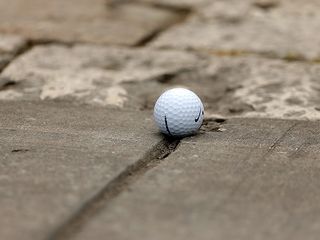There’s so much at stake on the mini-tours. One good tournament could be the launchpad for a long and lucrative career as a professional golfer.
However, desperation can often cloud people’s judgement and make them do funny things. On the mini-tours, away from the television cameras you see everywhere on the PGA Tour and DP World Tour – and with no rules officials walking with every group – the potential for cheating increases.
Even though honesty and integrity are fundamental to golf, can the desire to succeed sometimes be so strong that it makes people do things that contravene the spirit of the game?
According to GM’s Joe Ferguson, who played on the mini-tours for five years and competed in two DP World Tour events, cheating is commonplace at the lower level.
“I’ve witnessed multiple instances of cheating and heard so many more stories. There’s a lot of it going on,” says Joe.
“The rewards at the top end are so massively high and you have to go through so much garbage to get there: sleeping on floors, scraping up enough money to pay for entry fees and so on.
‘Desperation’
“The difference between top-level professional golf and low-level professional golf is gargantuan in terms of the money on offer, but not necessarily the ability. There are many people who believe they have the talent are some are just so desperate to make it that they’ll do some pretty bad things.
“There’s another side to the coin, too. If some people off the course aren’t convinced in your talent and don’t think you’re going down the right path and you’re having a stinker, that can influence you too.
“I’ve seen people cheat to save two shots when they’re going to shoot 84 and miss the cut anyway. I think it’s a pride and a shame thing as well.
“I’ve seen scorecards being changed between the end of the round and the scorer’s hut, people adamantly claiming they’ve had something on a hole when they clearly haven’t, people improving their lies, balls being dropped in the rough and more.
“One player in a EuroPro Tour event told his playing partners he’d hand the scorecards in, and when they handed them over, he got to work with his rubber and pencil and changed his score between the 18th green and the scorers’ hut.
“He was missing the cut by one and changed it so he was making the cut by one. Once they realised what was going on, they disqualified him. Normally that would get you a significant ban, but he was back playing the following week and everyone was up in arms about it. It was extraordinary.
The ‘magic pencil’ has been employed on more than one occasion
(Image credit: Getty Images)
“Another time on the Jamega Tour, someone’s ball was semi-plugged in a bunker and his playing partner had noted it. He then went back for a second read of his putt from behind the hole and noticed the ball was sitting up like a coconut in the sand with a ridge behind it.
“He started shouting at the player in question and the accusee played his shot while this guy was screaming at him, presumably to hide the evidence. I was in the group behind watching on the tee and our group was questioned about it.”
Not isolated incidents
Joe says the amount of cheating incidents he’s seen stretches “well into double figures”, which makes you wonder how much more goes on that is unseen. What’s more, Joe says discussions with his peers at dinner about what cheating incidents had been witnessed that particular day were commonplace. He’s also seen cheating by parents and coaches of players.
“One time, this guy was teeing off and our group saw an obvious splash into a water hazard miles right on this par 4. It was submerged; it was gone.
“His dad was down the right-hand side and all of a sudden we see his son’s ball sat up like a dream 15 yards past this hazard. It all kicked off. There was no chance the ball could have hit a rock or something and bounced out. The player in question said it was fine but we refused to sign his card. It was tricky as we didn’t have conclusive proof, so it became a ‘your word against his’ scenario.
“Another time, I was playing with someone who hit it up the left into the cabbage. After four-and-a-half minutes, his coach magically found his ball sitting on a path, the same path we’d all been walking up and down during the search.”

Joe has witnessed balls ‘magically’ appearing when clearly lost or in a penalty area
(Image credit: Getty Images)
The regional level
According to Joe, incidents of cheating occur all the way down the mini-tour food chain, even reaching the regional PGA level. On those circuits, you might earn somewhere between £1,000 and £2,000 for winning.
“Two guys have been banned in my region over the past five or six years. One was playing through and hit his ball wide left. The two guys who let him through saw where his ball finished and assumed he’d taken a penalty drop, as where he played his second shot from wasn’t anywhere near that spot.
“He asked the playing partner in the cheat’s group whether he’d taken a drop and he said ‘no, he found it, that was his second’. The people who let him through went to investigate and found his first ball with his initials on. It went to a PGA disciplinary panel and he was banned for three years.
“In the same region, this pro had been changing his scorecards in Pro-Ams, which can pay you £1,000 for a day’s work if you shoot two- or three-under-par.
“On this one occasion, he thought his playing partners had gone home, so he changed his score for the day from +4 to -4. But it turned out they’d actually just gone home to freshen up as they all lived close, before then coming back to the clubhouse.
“His team had assumed the scorers had accidentally put down a minus instead of a plus and brought it to their attention. It wasn’t pretty.”
While the vast majority of professional golfers play with honesty and integrity, it’s certainly not the case across the board. With so much riding on every tournament and vast riches on offer at the end of the rainbow, it’s perhaps not surprising. Whatever the circumstances, cheating can never be justified.



)






